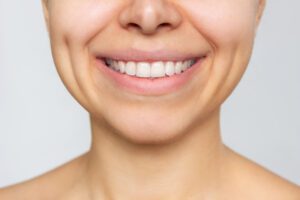A study published in the Journal of Clinical Periodontology suggests that individuals with gum disease have a higher risk of suffering from severe complications related to COVID-19. Though vaccinations have made many COVID-19 cases milder, the issue remains relevant. And with half of American adults contracting gum disease, the problem is also prevalent.
Taking care of your gums to avoid this infection of the gum tissue is more crucial than many people realize. Visit your dentist for routine dental care to reduce your risk of gum disease. Read on to learn more about gum disease and the importance of preventative periodontal care.

Do I Have Gum Disease?
The early stage of gum disease, gingivitis, can present with swelling, redness, soreness, or bleeding in the gum tissue as the bacteria create inflammation. But these symptoms could occur on an acute basis due to harsh teeth brushing, for instance. You should tell your dentist if the problems persist.
If the infection progresses, it will reach the tooth root and jawbone. You might notice discoloration in the teeth, gum recession, chronic bad breath, and looseness in your teeth at this point. But not every patient with gum disease will experience these clear symptoms.
This is why attending routine dental check-ups is so important. A dentist can perform a periodontal disease screening and spot gum disease that you might not realize you have.
Do not skip your dentist appointments and make sure you do not wait to contact your dentist if you notice issues with your gums. Gum disease can lead to severe and irreversible dental damage, including tooth loss, without prompt dental treatment.
How Do I Get Rid of Gum Disease?
If a dentist diagnoses you with gum disease, they can begin treating the infection right away. It will not go away on its own, so make sure you seek help from your dentist to get rid of gum disease for good.
They will thoroughly clean your teeth, scraping away excess plaque and bacterial build-up, especially deep in the gum pockets. The extensive cleaning technique is known as scaling and root planing.
If the problem persists after this periodontal therapy, you might need more invasive treatment like gum surgery to eradicate the infection. A dentist might also give you an antibacterial rinse to use at home to keep periodontal disease and its symptoms at bay.
How Can I Protect My Gums from Infection?
You can lower your risk of contracting gum disease by practicing good oral health care at home. This includes proper oral hygiene. Get rid of plaque and other harmful residues on your teeth to reduce the bacterial spread and therefore your chances of infecting your gums.
Attend routine teeth cleanings with your dentist to maximize oral hygiene benefits. Ask your dentist if rinsing with an antibacterial mouthwash will help protect your gums as well. It can balance your natural oral bacteria to prevent infection. Schedule an appointment today by calling our office at 610.756.0649.

